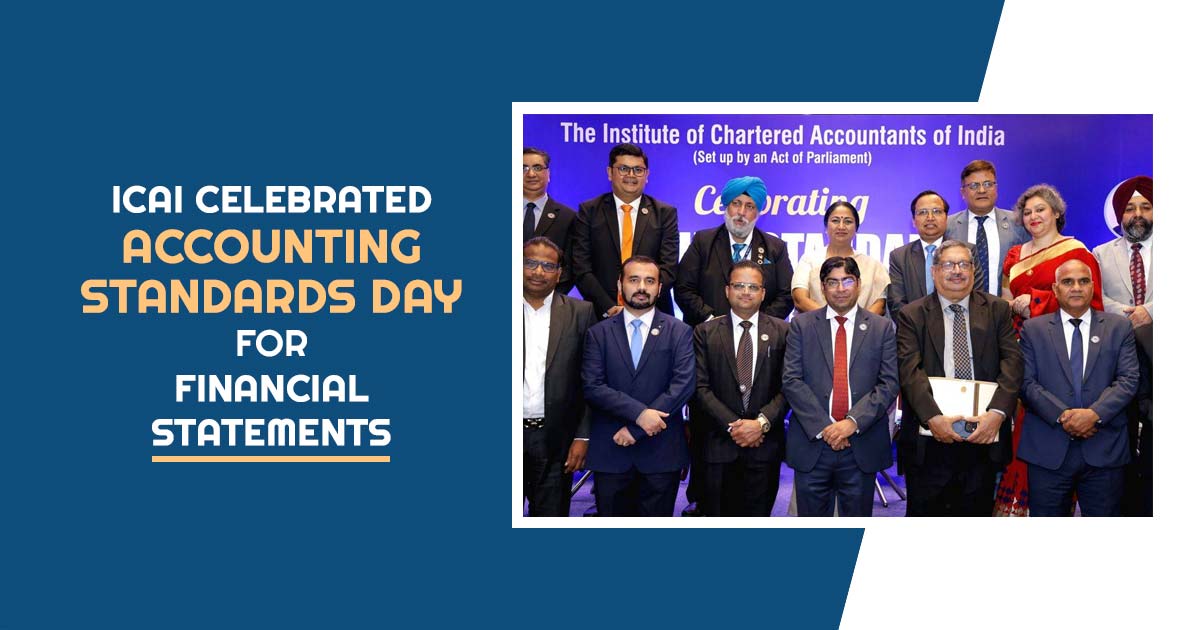
The Institute of Chartered Accountants of India (ICAI) celebrated Accounting Standards Day (AS Day) on the theme Navigating the Financial Reporting Landscape. The motive of the event is to involve the stakeholders and spread awareness for the significant role of Accounting Standards in the preparation of financial statements. AS Day was celebrated pan-India across all 5 regions, namely Delhi, Jaipur, Mumbai, Chennai, and Kolkata, reaching a wide audience of industry professionals.
Honourable Chief Minister of Delhi, Smt. Rekha Gupta, as the Chief Guest, inaugurated the event in Delhi in the presence of CA. Charanjot Singh Nanda, President, ICAI, CA. (Dr.) Sanjeev Kumar Singhal, Chairman, ASB; CA. Vishal Doshi, Vice Chairman, ASB, along with Chairman NIRC.
The Chartered Accountant role has been acknowledged by Smt. Rekha Gupta, Chief Minister of Delhi in tax collection and the country’s economic growth, referring to them as “Financial Doctors” who safeguard India’s financial health.
“Chartered Accountants are the financial doctors of our nation, safeguarding India’s economic health,” – says Smt. Rekha Gupta, Chief Minister, Delhi
Chartered Accountants partnering with the government in surging GST and income tax Compliance, says CA. Charanjot Singh Nanda, President, ICAI
She cited that, “Despite limited resources, Delhi has presented one of its largest-ever budgets, and I had full faith in our 45000 CA community based in Delhi, who will help us achieve our ambitious revenue goals. Your work goes beyond compliance; you drive transparency, promote tax awareness and make our systems more citizen-friendly. You may not wear a uniform or stand at the borders, but through your professional integrity and tireless commitment, you serve the nation every single day.”
She also suggested that the ICAI could serve as a knowledge partner for the Delhi Government to help achieve higher economic growth.
This main event united industry leaders, academics, and financial experts to discuss important developments, challenges, and the changing future of financial reporting in India.
The CA’s rising role in the technology world has been outlined by the CA. Charanjot Singh Nanda, President, ICAI, mentioned that, “Whether it is artificial intelligence, blockchain, the Internet of Things, data analytics, cybersecurity, or system audits – Indian Chartered Accountants are not just adapting, they are leading. From increasing GST and income tax compliance to leading global initiatives in forensic and remote auditing, ICAI professionals are recognised worldwide for their credibility, rigour, and integrity. ICAI is keen to partner Government in Delhi and provide technical expertise on various matters.”
Read Also: ICAI President CA Charanjot Singh Nanda’s 2025–26 Message
CA. Sanjeev Kumar Singhal, Chairman, Accounting Standards Board, mentioned that, “Sound financial reporting is the cornerstone of strong corporate governance and economic development. The efforts of the ASB and the broader ICAI ecosystem have built a robust framework that ensures transparency, comparability, and integrity in financial statements.”
Industry experts support the Vision of ICAI, making accounting frameworks and financial transparency stronger via global practices and innovation, on the following topics-
- Financial Reporting Excellence – A Preparer’s Perspective
- Reflections – A Decade of Indian Accounting Standards (IND AS)
- Emerging Topics – Indian Accounting Standards and IFRS
1500 members across the country attended the same event, and all panel discussions obtained effective responses from the attendees.
Here’s the official link from the Institute of Chartered Accountants of India (ICAI) about Accounting Standards Day 2025. Click here








